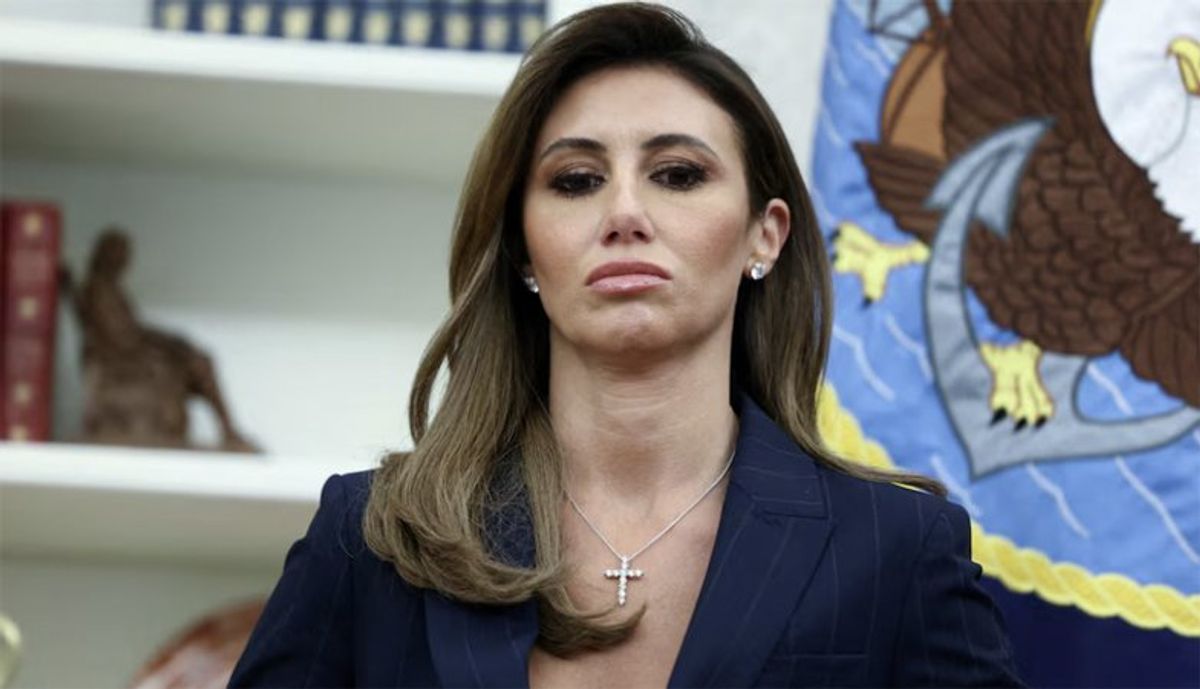
The Department of Justice has concocted an "unprecedented" scheme to preserve dozens of criminal cases filed by interim U.S. Attorney Alina Habba after a Manhattan defense attorney challenged her appointment.
Defense attorney Thomas Mirigliano, whose client was indicted by Habba on drug and weapons charges, was the first to challenge the validity of Habba's work, citing a controversial decision by U.S. District Judge Aileen Cannon to argue that Habba lacked the authority to bring charges in the case, reported NOTUS.
“I thought, ‘Wow, that’s a great idea," Mirigliano said after getting the idea after listening to an interview with former DOK prosecutor Andrew Weissman's. "I’m not a cocktail party guy. I have a lot of business in New Jersey, however ... I just have no allegiance to anyone except my clients, and I think I have gained respect for that. I have no problem saying what needs to be said. I don’t pull punches.”
Many more lawyers have followed Mirigliano's lead.
U.S. District Judge Matthew Brann ruled Aug. 21 that Habba “is not currently qualified to exercise the functions and duties of the office in an acting capacity” and “must be disqualified from participating in any ongoing cases" because her interim appointment by President Donald Trump ended without her Senate confirmation.
That move put hundreds of cases at risk in New Jersey.
“There’s a risk, but that office apparently thinks it’s worth the risk,” said one source.
The cases – ranging from firearms and drug trafficking to securities fraud and tax dodging – have been plunged into legal limbo since defense lawyers in New Jersey successfully challenged her appointment.
"NOTUS reviewed more than 140 criminal cases filed in recent months which show how Habba has largely brushed aside explicit court warnings about her dubious authority," the publication reported. "An analysis of those cases show that more than 39 indictments could be contested, because she signed them after July 1 — the point at which a judge deemed she acted 'without lawful authority.' Twenty-eight of those came after the judge’s ruling in August."
However, the Department of Justice has stepped in by involving its second-ranking official, who, like Habba, has previously served as Trump's personal defense attorney.
"On the same day the order was issued, Habba signed off on four different indictments — three for felony gun possession and another for cocaine dealing — except this time, right above her name in the signature block appeared that of a high-ranking official: Deputy Attorney General Todd Blanche," NOTUS reported.
Top DOJ officials typically are no involved in run-of-the-mill criminal matters, according to a legal expert who was stunned to see Blanche's signature on the indictments.
“They’re trying to make it seem like he’s ultimately responsible for the filing and to make any defects in her appointment immaterial by putting a higher up on the paperwork," said Rutgers University law professor David Noll. "This is all such wackadoodle, unprecedented territory. I’d be surprised if there’s an answer in case law as to whether the courts would accept it."
Appellate judges seemed doubtful that Habba could remain in her position during Oct. 20 arguments, and DOJ lawyers were unable to provide a clear date for when her time would run out, although DOJ counsel Henry Whitaker suggested that she could serve “successive 120-day appointments” to meet statutory requirements.
“Can you come up with an example of any time that such a concatenation of events has occurred with respect to the appointment of a United States attorney?” said Appellate Judge D. Brooks Smith.
“I guess I cannot,” Whitaker admitted, as Habba sat in the courtroom.




